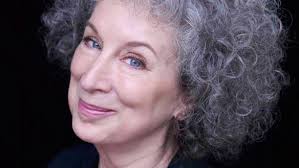 The moment she stepped onto the stage I was filled with the thrill of being in the same room as one of the bravest, most prolific and talented writers of our time – Margaret Atwood. Of course it was a rather large room (a hall in fact, the Queen Elizabeth Hall at the Southbank Centre to be precise) and I was sitting with several hundred others, but the thrill was there nevertheless – the frisson of being in the presence of a great mind.
The moment she stepped onto the stage I was filled with the thrill of being in the same room as one of the bravest, most prolific and talented writers of our time – Margaret Atwood. Of course it was a rather large room (a hall in fact, the Queen Elizabeth Hall at the Southbank Centre to be precise) and I was sitting with several hundred others, but the thrill was there nevertheless – the frisson of being in the presence of a great mind.
Margaret Atwood was in conversation with Peter Kemp, Literary Editor for The Sunday Times, who was profuse in his praise but who didn’t seem to quite be on the same page as the author when it came to political views – which made for interesting entertainment. At one point, Atwood brought up the recent furor surrounding the absence of female figures on English pound notes (bar the Queen of course!), for instance, the fact that Charles Dickens has featured on the notes, but not Jane Austen. Kemp guffawed and said, ‘So much fuss about something like that’. Atwood rightly reminded him that this recent event recalls the late Sixties and Seventies when ‘much fuss’ was made about lots of things that people would never have imagined people could make a fuss about (equal pay for women and men being one of those things – although, of course, parity of income between the sexes is sadly still an issue that is far from resolved today!).
When the questions were opened up to the audience, Atwood was asked what she thought about the position of women in contemporary times and she provided an interesting answer. She said that she thought that feminism comes in waves / cycles, and has much to do with grandmothers, mothers and granddaughters. She believes that in the Eighties and Nineties there was a reaction against the feminism of the Sixties and Seventies by daughters who did not want to be like their mothers, but that today there seems to be a lot of young women, the granddaughters of the earlier feminists, who are interested in feminist issues. I thought this was an interesting analogy although her answer to the question was a bit reductive. I was expecting a more expansive response on the subject of women’s position in society from the author of The Handmaid’s Tale.
On the whole, Atwood was much less obviously radical in her views than one would expect after reading her fiction. But then the Writer is always different from the Person. The latter lives in the world, while the former writes about it – describes and comments on it through the liberating lens of the imagination. On the page, Atwood is free to envisage new worlds and new possibilities for the human race, whereas on the stage she was much more philosophical, proclaiming that cloning and DNA splicing is neither good nor bad – ‘just another human tool’. As she later said when discussing the question of whether the arts should be funded by oil companies (it turns out that the Southbank Centre is partially funded by Shell), human politics is complicated, because where there are advantages there are also disadvantages.
What came across most of all this evening is that Margaret Atwood is a down-to-earth ordinary person, only with more creative ability than most and much more wit. Her sense of humour is so clever and self-deprecating that she had the entire auditorium laughing out loud on several occasions. Atwood is also unafraid to ask difficult questions, which is the task of all great artists. As poet and Goldsmiths tutor Jack Underwood has frequently told me, ‘Poetry is about questions, not answers.’ And by this I am sure he means all great art. Of course when the right questions are asked, it is a vital first step towards discovering a possible solution.
The talk was highly enjoyable and intellectually stimulating; it was such a treat to have a great writer and a great mind sharing her thoughts and her wit. I was a bit disappointed that Ms Atwood did not read aloud from her latest work, MaddAddam, the final book in the Oryx and Crake trilogy, although I was glad that the short time was taken up in conversation rather than in reading. Next time, I hope the event will be closer to two hours rather than one – although I’m sure if it were two, I would ask for three (I doubt that my desire to hear Margaret Atwood talk could ever be sated). The thing to do now, I suppose, is to tuck into her tomes.